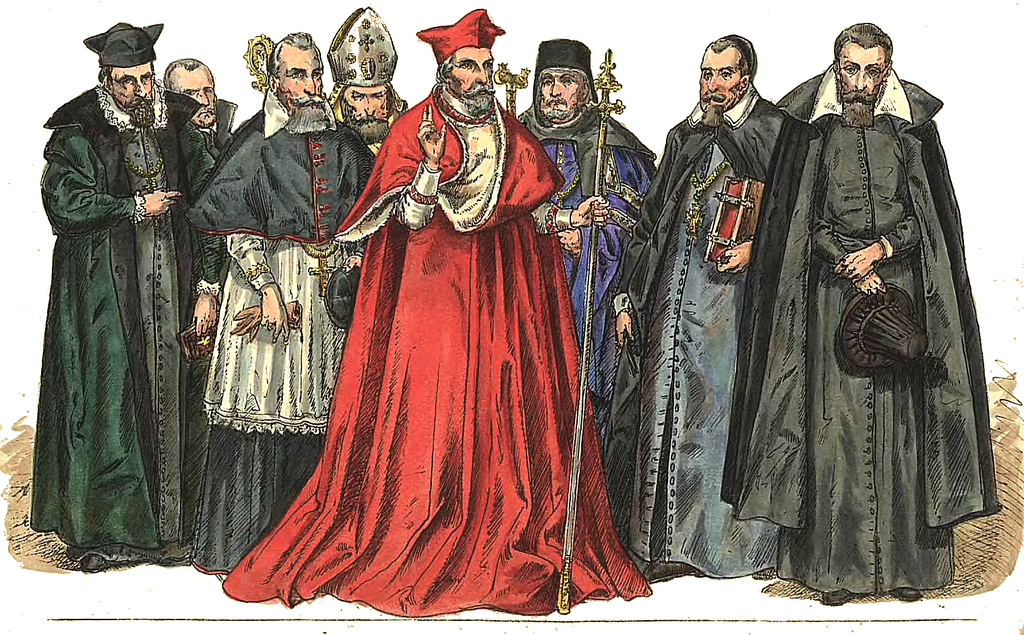Stamp: Gregoire de Tours. fourteenth centenary (France, German Occupation In WWII 1940)
Gregoire de Tours. fourteenth centenary (France, German Occupation In WWII 1940)
01 July (France, German Occupation In WWII ) within release Dunkirk goes into circulation Stamp Gregoire de Tours. fourteenth centenary face value 90 French centime
| Stamp Gregoire de Tours. fourteenth centenary in catalogues | |
|---|---|
| Michel: | Mi: DE-FR 156 |
Stamp is vertical format.
Overprint type I - top of frame curved at right side. Overprint often placed over two or more stamps due to size, so smaller single stamps may only show part of the overprint. Beware of forgeries. Best collected on piece or on full cover. Expertisation highly recommended. Overprint on Mi: FR 454Also in the issue Dunkirk:
- Stamp - 100th Atlantic Crossing of French Postal Aircraft face value 1.50;
- Stamp - 150th Anniversary of the Revolution: the oath of the Jeu de face value 90;
- Stamp - 150th Anniversary US Constitution, France congratulating USA face value 1.75;
- Stamp - 1939 International Water Exhibition: Machine de Marly face value 2.25;
- Stamp - 75th anniversary of the founding of the Red Cross 1864 face value 90+35;
- Stamp - Avignon- The Palais des Papes and the Pont Bénazet face value 3;
- Stamp - Battleship "The Clemenceau" face value 90;
- Stamp - Breton river face value 2;
- Stamp - Canadian Vimy Monument face value 1.50;
- Stamp - Carcassonne face value 5;
- Stamp - Centenary of Photography 1839. Niépce and Daguerre face value 2.25;
- Stamp - Chamonix-Mont-Blanc F.I.S. face value 1.50;
- Stamp - Clément Ader face value 50;
- Stamp - Congress of Railways Fer.PARIS 1937. Streamlined steam locom face value 1.50;
- Stamp - Fiftieth anniversary of the Eiffel Tower face value 90+50;
- Stamp - Football: World Cup 1938 FIFA - FFFA face value 1.75;
- Stamp - For birth face value 90+60;
- Stamp - For our soldiers face value 1+0.50;
- Stamp - For the unemployed intellectuals - Louis Pasteur face value 1.50+0.50;
- Stamp - For the unemployed intellectuals: Auguste Rodin face value 1+0.10;
- Stamp - For the unemployed intellectuals: Louis Pasteur face value 1.75+0.25;
- Stamp - For the unemployed intellectuals. Auguste Rodin (1840-1917) face value 90+10;
- Stamp - For the unemployed intellectuals. Claude Bernard (1813-1878) face value 2.25+0.25;
- Stamp - For the unemployed intellectuals.Honoré de Balzac face value 90+10;
- Stamp - Globe face value 90;
- Stamp - Globe face value 1.50;
- Stamp - Gregoire de Tours. fourteenth centenary face value 90;
- Stamp - Help for children of unemployed face value 90+35;
- Stamp - International Exhibition of Paris face value 1.50;
- Stamp - Jean Jaurès (1859-1914) face value 1.50;
- Stamp - Jean-Baptiste Charcot. Society of Sea Works face value 90+35;
- Stamp - La Rochelle- Harbour (type III) face value 10;
- Stamp - Lafayette, Washington, "Spirit of St. Louis" face value 1.50;
- Stamp - Le Puy en Velay face value 90;
- Stamp - Lyon: Bridge Guillotière face value 90;
- Stamp - Mermoz, Jean (1901-1936) face value 3;
- Stamp - Miners face value 2.15;
- Stamp - Ministry of PTT. PTT works orphans face value 90+35;
- Stamp - Mont Saint Michel face value 5;
- Stamp - National Monument to the victims of war. Leon Trulin face value 90+35;
- Stamp - Pass road Iseran (Savoy) Alt. 2769 m face value 90;
- Stamp - Pau: The castle and the Gave de Pau face value 90;
- Stamp - Paul Cézanne (1839-1906) painter; self portrait face value 2.25;
- Stamp - PAX: International Rally for Peace in Paris face value 1.50;
- Stamp - Pierre (1859-1906) and Marie (1867-1934) Curie face value 1.75+0.50;
- Stamp - Plane flying over Paris face value 3;
- Stamp - Plane flying over Paris face value 3.50;
- Stamp - Radio for the blind face value 90+25;
- Stamp - René Descartes (1596-1650) Discours sur la méthode face value 90;
- Stamp - St. Malo-the City face value 20;
- Stamp - Tercentenary of the birth of Dom Perignon. Champagne face value 1.75;
- Stamp - The liner Normandie face value 1.50;
- Stamp - To save the human race face value 90+30;
- Stamp - Triumphal Arch of Orange face value 2;
- Stamp - Verdun 1916-1939.Porte Chaussée face value 90;
- Stamp - Versailles: Seasons French national art face value 1.75+0.75;
- Stamp - Visit of British monarchs face value 1.75;
- Stamp - War aid. Marshal Foch face value 1+0.50;
- Stamp - War aid. Marshal Joseph-Simon Gallieni face value 1.50+0.50;
- Stamp - War aid. Woman plowing face value 2.50+0.50;
- Stamp - World Exhibition in New York in 1939. The flag of France face value 2.25;
- Stamp - World Map Showing French Possessions face value 1+0.25;
- Stamp - Congress of B.I.T. face value 50;
- Stamp - For our soldiers face value 1+0.50;
- Stamp - War aid. Marshal Foch face value 1+0.50;
- Stamp - War aid. Marshal Foch face value 1+0.50;
- Stamp - World Map Showing French Possessions face value 1+0.25;
Stamp Gregoire de Tours. fourteenth centenary it reflects the thematic directions:
Clergy are formal leaders within established religions. Their roles and functions vary in different religious traditions, but usually involve presiding over specific rituals and teaching their religion's doctrines and practices. Some of the terms used for individual clergy are clergyman, clergywoman, clergyperson, churchman, cleric, ecclesiastic, and vicegerent while clerk in holy orders has a long history but is rarely used
A historian is a person who studies and writes about the past and is regarded as an authority on it. Historians are concerned with the continuous, methodical narrative and research of past events as relating to the human species; as well as the study of all history in time. Some historians are recognized by publications or training and experience. "Historian" became a professional occupation in the late nineteenth century as research universities were emerging in Germany and elsewhere.
Religion is any cultural system of designated behaviors and practices, world views, texts, sanctified places, ethics, or organizations, that relate humanity to the supernatural or transcendental. Religions relate humanity to what anthropologist Clifford Geertz has referred to as a cosmic "order of existence". Different religions may or may not contain various elements ranging from the "divine", "sacred things", "faith", a "supernatural being or supernatural beings" or "some sort of ultimacy and transcendence that will provide norms and power for the rest of life". Religious practices may include rituals, sermons, commemoration or veneration (of deities), sacrifices, festivals, feasts, trances, initiations, funerary services, matrimonial services, meditation, prayer, music, art, dance, public service, or other aspects of human culture. Religions have sacred histories and narratives, which may be preserved in sacred scriptures, and symbols and holy places, that aim mostly to give a meaning to life. Religions may contain symbolic stories, which are sometimes said by followers to be true, that have the side purpose of explaining the origin of life, the Universe and other things. Traditionally, faith, in addition to reason, has been considered a source of religious beliefs. There are an estimated 10,000 distinct religions worldwide. About 84% of the world's population is affiliated with one of the five largest religions, namely Christianity, Islam, Hinduism, Buddhism or forms of folk religion.


